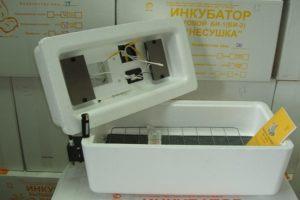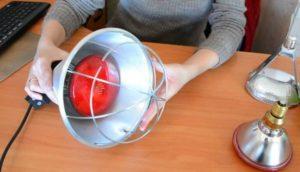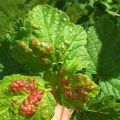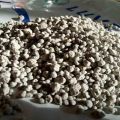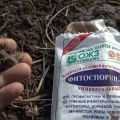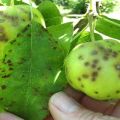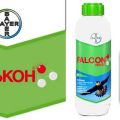Instructions for the use of Iodinol for chickens, recipe and dosage
One of the simplest and most common modern medicines for chickens is Iodinol. With a simple composition and many medicinal properties, it helps to effectively fight many diseases in poultry of different ages. At the same time, it also has such advantages as low cost, convenient form of release, ease of dosage and application, and the possibility of self-production.
Composition and release form of the drug
Iodinol (blue iodine) is a medicinal antiseptic agent for pets and poultry with a pronounced antimicrobial effect.
The composition of 100 grams of the drug includes the following components:
- Crystalline iodine (I) - 0.1 grams.
- Potassium iodide (KI) - 0.3 grams.
- Polyvinyl alcohol (C2H4O)x - 0.9 grams.
- Distilled water (H2O) - 98.7 grams.
Iodinol is produced in the form of an aqueous solution of a deep blue color, which has a specific smell of iodine and foams when shaken.
The effectiveness of the tool
The high efficiency of the use of this drug for the treatment of various diseases of chickens and laying hens is due to the fact that it has the following effects on the body of the bird:
- Anti-inflammatory - the drug prevents the occurrence of inflammatory processes; when detected, it can slow down their development and spread.
- Antiseptic - helps to disinfect wounds and various damage to the skin.
- Bactericidal - the iodine contained in the preparation inhibits pathogenic microflora.
- Resorptive - Iodinol normalizes the course of the most important metabolic processes, accelerates dissimilation, improves the synthesis of thyroid hormones (synthesis of T3 and T4).
- Immunostimulating - taking Iodinol helps to strengthen the immune system of poultry, reduces the risk of contracting various diseases.
All these properties of the drug are due not only to the presence in its composition of iodine and its potassium salt, but also polyvinyl alcohol, which significantly reduces the irritating effect of iodine compounds and increases the duration of the drug.
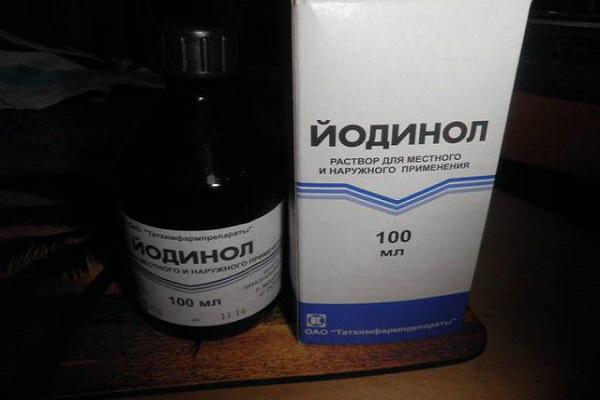
What does it help from?
Iodinol is used to treat chicken diseases such as:
- Pullorosis.
- Coccidiosis.
- Gastrointestinal dyspepsia.
- Pyoderma (purulent inflammation of the skin caused by the penetration of pathogenic microflora into it - pyogenic cocci).
Also, this drug is used to disinfect small skin wounds, rinsing opened abscesses, inflamed areas of mucous membranes.
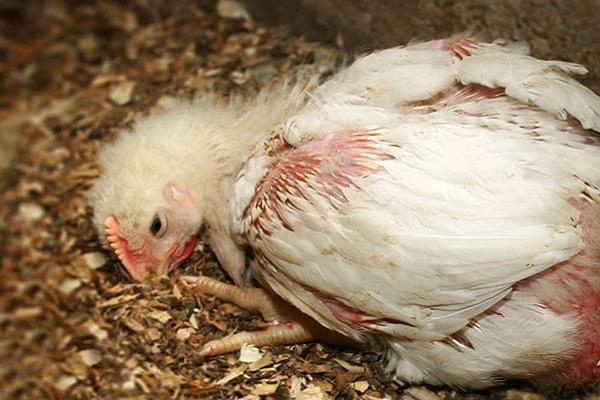
Preparation and storage
In addition to the fact that this drug can be purchased at an affordable price, its self-production does not require large costs and significant efforts.
In order to prepare the simplest homemade analogue of Iodinol according to the recipe of the famous Soviet scientist V.O. Mokhnach, you must:
- Dilute 10 grams of dry potato starch in 50 milliliters of clean water.
- Add 10 grams of granulated sugar and 0.4 grams of citric acid to the solution.
- Boil 150 ml of water in a small container and pour the resulting solution into boiling water.
- Cool the resulting "jelly" and pour into it 1 teaspoon of 5% alcohol tincture of iodine.
Store the resulting homemade medicine in a container tightly closed with a lid, in a dark and cool place, at a temperature not higher than +3 FROM.
The dosage and methods of application of the resulting drug do not differ from the store counterpart.

How to apply?
The dosage, method of administration and duration of taking the drug depend on which disease it is used to treat:
- With pullorosis of chicks of one week old - 0.5 milliliters per chick, three times a day, for 6-7 days. To prevent relapse of the disease, the drug is continued to be given after the completion of the course of treatment for another 3-5 days.
- In case of infection of chickens with coccidiosis - 0.3-0.5 milliliters per chicken, 3 times a day, for 5-6 days. In the case of a severe form of the disease, the drug is prescribed in a dose of up to 1 milliliter 3 times a day. In this case, the duration of the course of treatment remains the same as with the usual dosage, and the therapeutic effect from the use of the drug is observed already on the 3rd or 4th day.
- For the treatment of gastrointestinal dyspepsia - 0.3-0.5 milliliters per 1 chicken, three times a day, for a week. With a moderate and mild form of the disease, chickens recover within 2-3 days. For the prevention of dyspepsia, the drug is given to chickens for 2 weeks once a day with drinking water, while reducing the dose to 0.2-0.3 milliliters.
- Various types of pyoderma - for the treatment of various types of skin inflammation with this remedy, the affected areas are carefully treated with an undiluted solution.
Important. Before using the drug, you must read all the recommendations that are given in the instructions for use.
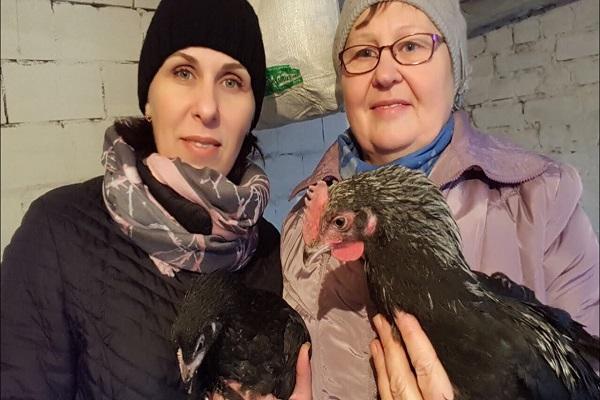
Iodine checker
Iodine checker - powder or tightly compressed tablets containing about 40% of the active substance and 60% of auxiliary components necessary for normal combustion and the release of iodine vapor.
Iodine checkers are used for the following purposes:
- Disinfection of premises for keeping chickens.
- Sanitation (improvement) of the air in the chicken coop.
- Treatment of pulmonary (respiratory) infectious and non-infectious diseases.
This drug is used by laying out packages of powder or tablets at several points in the house and setting it on fire with an ordinary household match. In this case, all doors and windows must be tightly closed, and the existing artificial forced ventilation must be turned off.
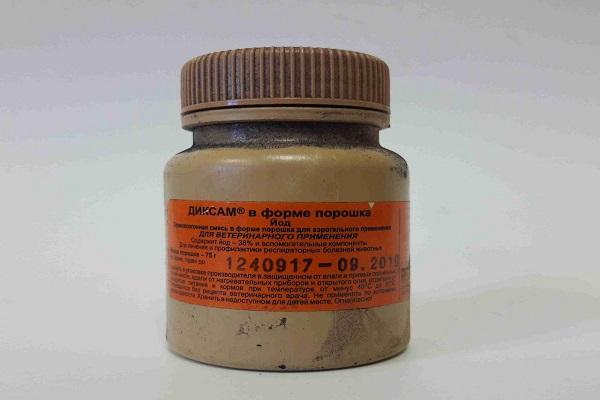
Before using the drug, its dose, as well as the duration of its treatment of the poultry house, is selected from the instructions for use offered to each container with powder or tablets.
Precautions when working with medication
When using Iodinol, observe the following precautions:
- When working with the drug, in order to prevent it from getting on the mucous membranes of the eyes and lungs, use goggles and a respirator.
- During treatment procedures, you must not smoke, eat, drink liquids from open bottles.
- After finishing work with the preparation, wash hands thoroughly.
- Store the drug out of the reach of small children and pets.
If the drug itself gets on the skin, they are washed under running water. If the drug has got into the digestive tract, you should urgently rinse the stomach and consult a doctor immediately.

Side effects
The few side effects of the drug include allergic skin rashes, the occurrence of non-infectious rhinitis in chickens (runny nose).
Contraindications to use
Contraindications to the use of Iodinol are:
- Intolerance to the active substance of the drug (iodine).
- Thyrotoxicosis (increased production of hormones).
- Hepertiform dermatitis.
It is also not recommended to use this drug for diarrhea, tuberculosis, pathologies in the structure of internal organs.
